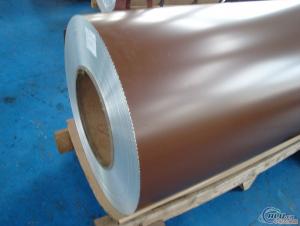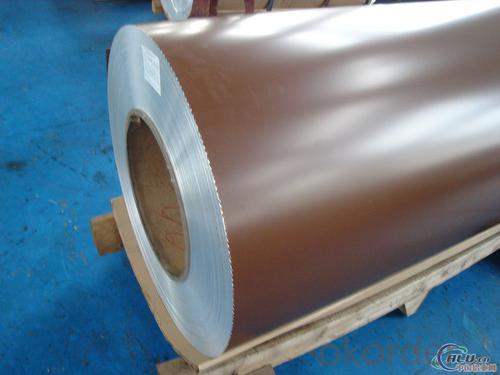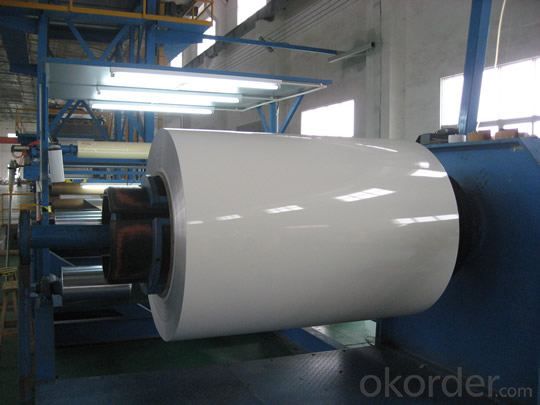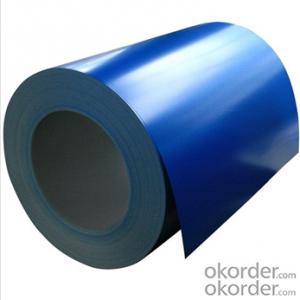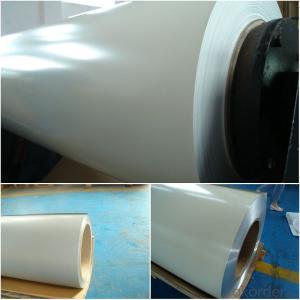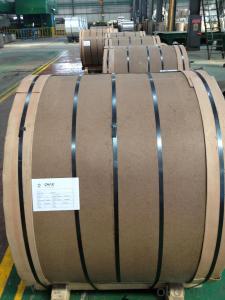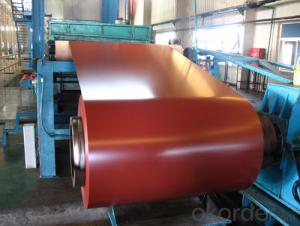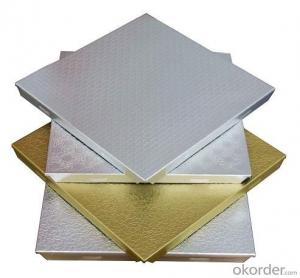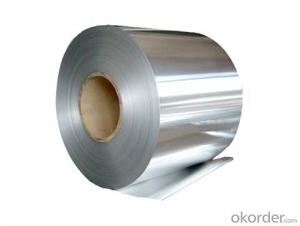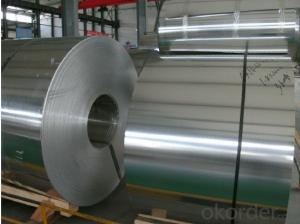Aluminum Coil Sheet - Color Coated Polyester for Windows
- Loading Port:
- China Main Port
- Payment Terms:
- TT or LC
- Min Order Qty:
- -
- Supply Capability:
- -
OKorder Service Pledge
OKorder Financial Service
You Might Also Like
1.Structure of Aluminium Color Coated for Windows Description
PE Coated aluminium coils are widly used in decoration field. For the painting, it depends on the using evironment. If you use in the open air, we recommend the PVDF coated aluminium coils. This kind of painting can last 15-20 years. If you use in the room, we recommend PE coated aluminium coils. The price is much more competitive.
2. Main features of the product
a.Competitive price---We have our own mills and can produce mill finished aluminium coils, so we can control the production cost better.
b.Professional after-sale service---We have more than 15 years exportation experience and you need not worry about the exporation problems.
c.Fast delivery time---We can control the delivery time within 35 days.
3. Image
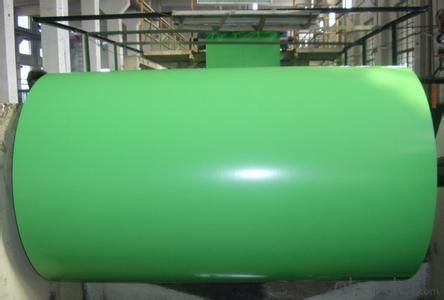
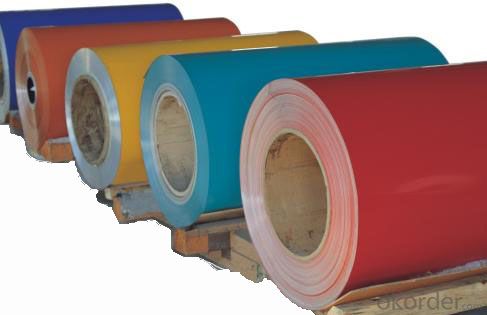
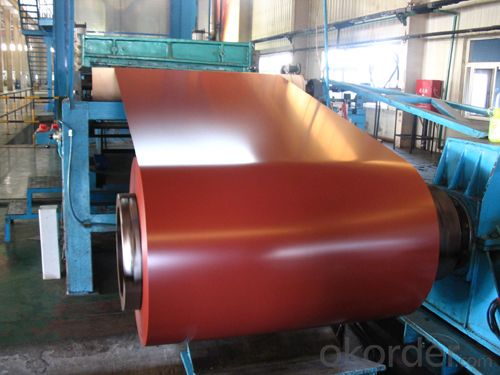
4. Products Specification
| Alloy | Paints | Coating Thickness | Period | Final Usage |
| AA3003 | PE | 22-25 MICRONS | 10-15 YEARS | WINDOWS |
5.FAQ
What is the quality standard?
---Usually our standard is GB3880-2006
What is the largest width?
---It is 2300mm
What is the MOQ?
---Usually we can accept 80 tons.
- Q: Can aluminum coils be used in food processing industries?
- Aluminum coils find applications in the food processing industry. This is because aluminum possesses several advantageous properties that make it a popular choice in this field. It is a lightweight and flexible material with excellent thermal conductivity. These characteristics make it ideal for various uses such as refrigeration, heat exchangers, and ovens in food processing. Moreover, aluminum is non-toxic, resistant to corrosion, and does not affect the taste or odor of the food being processed. Therefore, it is a safe and hygienic option for food processing equipment. Additionally, aluminum coils are easy to clean and maintain, ensuring the highest standards of cleanliness and food safety are upheld. Consequently, due to their outstanding performance and suitability for food-related applications, aluminum coils are widely accepted and utilized in the food processing industry.
- Q: Can aluminum coils be used in the manufacturing of automotive wheels?
- Yes, aluminum coils can be used in the manufacturing of automotive wheels. Aluminum is a lightweight and durable material that is commonly used in the production of wheels due to its high strength-to-weight ratio and corrosion resistance. It allows for better fuel efficiency and improved vehicle performance.
- Q: What are the proper storage methods to maintain the quality of aluminum coil for future use?
- <p>To store aluminum coil for future use, ensure it is kept in a cool, dry place away from direct sunlight and moisture. Stack the coils on flat, level surfaces with appropriate padding to prevent damage. Avoid stacking with other metals to prevent galvanic corrosion. Use clean, dry hands or gloves when handling to prevent oil and dirt from contaminating the surface. Store in a controlled environment with a relative humidity below 65% and a temperature between 32掳F to 90掳F (0掳C to 32掳C). Regularly inspect the coils for any signs of corrosion or damage.</p>
- Q: Is it safe and effective to use aluminum coils for baking purposes?
- <p>Aluminum coils are generally not recommended for baking. While aluminum is a good conductor of heat and is used in some baking pans, using aluminum coils directly in baking can lead to uneven heating and potential health concerns due to the leaching of aluminum into the food. It's better to use materials specifically designed for baking, such as silicone or metal baking sheets, which are safe and provide even heat distribution.</p>
- Q: What is the thermal conductivity of aluminum coils?
- Compared to other metals, aluminum coils exhibit a relatively high thermal conductivity. With approximately 237 W/m·K, aluminum possesses excellent heat conduction capabilities. This particular attribute renders aluminum coils well-suited for situations necessitating efficient heat transfer, like heat exchangers or air conditioning systems. The remarkable thermal conductivity of aluminum enables rapid and effective dissipation of heat, thereby guaranteeing optimal performance and energy efficiency across diverse industrial and residential environments.
- Q: What are the different grades of aluminum used in coils?
- There are several different grades of aluminum used in coils, each with its own specific properties and applications. The most commonly used grades include: 1. 1000 series: This grade of aluminum is commercially pure and has excellent corrosion resistance. It is often used in applications where high corrosion resistance is required, such as in chemical processing equipment or marine components. 2. 3000 series: These alloys are known for their moderate strength and excellent formability. They are often used in cooking utensils, heat exchangers, and general sheet metal fabrication. 3. 5000 series: This grade of aluminum is known for its excellent weldability and corrosion resistance. It is commonly used in marine environments, as well as in transportation and structural components. 4. 6000 series: These alloys are known for their combination of strength, formability, and corrosion resistance. They are widely used in architectural applications, such as window frames, doors, and curtain walls. 5. 7000 series: This grade of aluminum is known for its high strength and toughness. It is often used in aerospace applications, as well as in sporting goods and automotive parts where strength is critical. These are just a few examples of the different grades of aluminum used in coils. The choice of the grade depends on the specific requirements of the application, such as strength, corrosion resistance, formability, and weldability.
- Q: Can aluminum coils be used for HVAC condenser coils?
- Yes, aluminum coils can be used for HVAC condenser coils. Aluminum is a popular choice for condenser coils due to its excellent heat transfer properties, durability, and resistance to corrosion. Additionally, aluminum coils are lightweight, making them easier to install and transport.
- Q: What is the thickness tolerance of aluminum coils?
- The thickness tolerance of aluminum coils varies depending on the grade and manufacturing process. Typically, aluminum coils have a standard thickness tolerance of approximately +/- 0.005 inches (+/- 0.13 mm). However, it is important to note that this tolerance can be further adjusted or refined based on the specific requirements of the customer and the capabilities of the manufacturer. Certain specialized aluminum coil manufacturers may offer even tighter thickness tolerances, usually around +/- 0.002 inches (+/- 0.05 mm), to cater to more precise or demanding applications. To ensure the desired thickness tolerance is met for a specific project or application, it is always recommended to consult with the manufacturer or supplier.
- Q: I heard that one pound of aluminum pop tabs are worth more then a pound of aluminum pop cans. Is this true? Thank you.
- actuality. You ask a question with constrained area and then want information to help. what number information do you have time and area for? first of all, the Bible has been used for geographic accuracy. 2nd, this is been used for archaeological accuracy. 0.33, this is been used for historic accuracy. The Bible pronounced the earth became around approximately 700BC in the past astronomers knew it. Many have wondered the Bible at circumstances even with the undeniable fact that those questions blow away. occasion, scientists wondered regardless of if the Hittites have been a genuine those that have been pronounced interior the Bible till archaeologists chanced on pictures and inscriptions at some websites.The Bible has survived many tries at burying it or destroying it. i.e. the Romans, the Catholic Church, purges, and extreme persecution of its adherents.The Romans have been famous for his or her tortures for 315 years yet Christianity based on the Bible grew besides! i will advise 5 staggering books that answer this authoritatively interior the source section. That technology is named Apologetics. this may well be an excellent, significant question -demands an excellent answer.
- Q: How are aluminum coils stored and transported?
- Aluminum coils are typically stored and transported in various ways depending on their size and weight. They are commonly stored in warehouses or outdoor storage facilities, where they are organized and stacked horizontally on pallets or racks. To ensure their protection, coils are often covered with a protective material such as plastic or shrink wrap. When it comes to transportation, aluminum coils are usually loaded onto trucks, containers, or flatbed trailers for long-distance journeys. To prevent damage during transit, the coils are secured using straps, chains, or other fastening methods. Additionally, specialized equipment like coil racks or cradles can be used to provide extra support and stability. Overall, proper storage and transportation practices are crucial to maintain the integrity of aluminum coils and prevent any potential harm.
Send your message to us
Aluminum Coil Sheet - Color Coated Polyester for Windows
- Loading Port:
- China Main Port
- Payment Terms:
- TT or LC
- Min Order Qty:
- -
- Supply Capability:
- -
OKorder Service Pledge
OKorder Financial Service
Similar products
Hot products
Hot Searches
Related keywords
